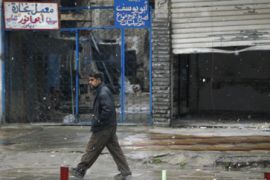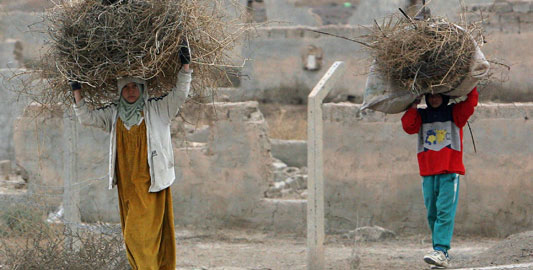Iraq Diary: Baghdad’s snow day
Al Jazeera’s Hoda Abdel Hamid writes on life as a reporter in the Iraqi capital.

 |
| Many Iraqis are struggling without electricity and hot water during a cold winter [AFP] |
It snowed today in Baghdad for the first time in living memory.
It was early in the morning and melted away immediately.
I heard the news from one of my colleagues in Doha. She called and said: “Look out of the window.” I couldn’t because all of our windows are blocked off in case of an attack or to fend off any shrapnel that could land here following an explosion somewhere not too far away.
Speaking of which, I must say I’ve been here for three days and have not heard a single one.
That doesn’t mean it is all quiet and peaceful here, but last year at the same time, I used to get rocked out of bed every morning by the sound and, sometimes shockwaves, of car bombs and suicide bombers.
More would follow during the day and at night, it was the turn of mortars flying across the city and landing in the dark somewhere. Most of the time, we had no clue where. Nights are very quiet now too.
Relative calm
While enjoying the relative calm, the Iraqis I have talked to so far are still not very optimistic.
They admit that security has improved somehow, but it’s snowing, it’s cold, and they have no electricity or hot water. Nor do they have jobs. So life is still extremely difficult, even more so because most people have already sold all their belongings and finished off their savings.
We all have our meals together. It’s usually a very interesting moment, because my Iraqi colleagues tell me about life on the streets, the life I am not allowed to witness.
A foreigner on the streets (even if Arab) is a prime target for armed groups, militias and also for the thousands of criminal gangs that roam freely in search of a good ransom.
I actually got a bit excited by the drop in violence and asked if there was anywhere I could go.
The answer was no, and none of the Iraqis want to be seen on the streets with a foreigner who is reporting in English. They will do it if the job requires it, but they would rather not.
So they are the ones who go out, whether it is to get the story or the food.
I usually understand, from their facial expression upon return, how bad or good the situation “out there” is. They are the barometer. There is a look of relief at the moment.